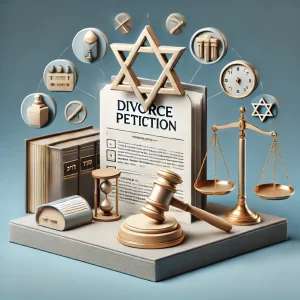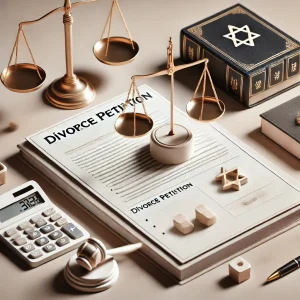As stated, in the Family Court the claims involved in the divorce proceeding itself will be heard, whether the parties have filed their claim there or which of the parties has filed his claim first. The judges who sit in the family court are different from the judges who sit in the rabbinical court, and therefore their rulings and their handling of the different cases differ.
The rabbinical court tends to rule according to the principles of Jewish Halakhah and religious law, while the family court tends to rule according to existing laws and rulings. The most common question among spouses considering a divorce lawsuit is, is it better to open a divorce case in the rabbinate? Should I apply to the Rabbinical Court or the Family Court? The answer is not clear or uniform, and it is important to consult a divorce lawyer who will examine the case on its own merits.

So you have decided to open a divorce case in the Rabbinate, and then the question arises, is this the right thing for you. Many people do not know or understand the difference between a rabbinical court and a family court. The difference is substantial, for the rabbinical court and only for him, the authority for divorce is given. In the Family Court the other matters involved in the divorce proceedings such as division of property, alimony and stay arrangements can be discussed. The other divorce matters can also be discussed in the rabbinical court, but there are rules according to which spouses can discuss these matters in the rabbinical court. The race for power is about competition between the parties, because whichever of the spouses will get the court or tribunal and file his claim first, will decide where the claim will be heard. Therefore, only an attorney who examines your personal case will be able to make a professional recommendation regarding the opening of a divorce case in the Rabbinate.
Opening a divorce case in court is generally not a pleasant and short procedure, especially when there are no agreements between the spouses. Divorce proceedings can last for many months and even years. Another way the couple can divorce is through a divorce agreement. The parties can resort to mediation, a procedure that is more pleasant and friendly than a divorce proceeding within the walls of the court. The parties can apply for this procedure alone, or equip each of the spouses (or just one of them) with the representation of a family lawyer who will protect the interests of the client throughout the procedure. The couple can formulate a divorce agreement that will reflect all the desires and disputes which bother them, and after signing the agreement go to the court or family court which will give it the force of a judgment.
The divorce process is not a simple thing at all. This is a period saturated with physical and mental changes and involves great difficulty. Even when there is an agreement between the parties, the very thought of divorce is not a simple thing, especially when there is no agreement between the spouses and the divorce is accompanied by many conflicts within the walls of the court and outside it.
One difficulty that accompanies many couples who are facing divorce proceedings, is related to the financial aspect of the procedure, the concern is that their financial situation will deteriorate without the support of the spouse in livelihood, as it has been so far. Another concern lies in the payment of alimony and their amount. The fathers fear that the payment that will be ruled for them will be high, on the other hand the mothers fear that the payment will not be sufficient and they will collapse under the burden of raising the children alone. Another difficulty is related to dealing with the divorce proceedings and life after the proceedings.
Such as what will my life look like from now on? Will I be lonely? How will my friends and family respond? How to start a divorce proceeding and more questions which at the beginning of the proceeding remain unanswered. Another and main difficulty lies in the joint children, beyond the concern for the children’s response to the procedure, there is a fear that the relationship between the parent and the child will be undermined and there will be no closeness between them, as in the past. The longer the divorce process, the more expensive and difficult it is, and the questions only multiply.
Many couples come to the process when they do not know how long it is going to take, how long they will be in a state of separation and will have to be in this uncomfortable intermediate state. Let’s face it, the divorce process, even if it is perfectly managed or done with mutual consent, is not yet a process that one may consider as “pleasant”. It is not a simple emotional process for everyone involved, especially if children are involved, and it involves many changes. The meaning of a long legal process touches on several areas like the economic, emotional and logistical area in terms of lifestyle changes and more. There are matters that remain open and they require immediate attention, such as: continuing to live together or separating a place of residence, caring for the children and sharing the arrangements with them, sharing expenses and immediate financial obligations. My recommendation is to estimate in advance how long the process will take for your lawyer and by doing so you will avoid uncertainty and be able to properly prepare for the challenging path ahead.

A divorce case usually consists of four lawsuits – a divorce lawsuit, a property lawsuit, a child support lawsuit and a custody lawsuit – there are cases where legal proceedings are required that include additional lawsuits such as a Ktubah lawsuit, defamation lawsuit, wife alimony lawsuit, business reputation lawsuit, eviction lawsuit and more.
Family attorneys usually price the cost of legal support and representation according to their legal knowledge and involvement level that will be required of them. Unlike other areas of law, it is not acceptable to pay by hours of work or by success rates for escorting and representing in a divorce proceeding. Only after a counseling session is held during which the client tells about the background of his personal case, and the lawyer asks additional questions to check that nothing is dropped in the story that will affect the continuation of the process.
Once the lawyer understands who the people involved are (i.e. getting information about the spouse) the goals they want to achieve, what will be considered a success, which of the five ways to act will achieve the best result in the case in question – only then can a quote be given – because each one of the ways we choose to act consists of different actions, different requests, different responses and a different amount of discussions, which is expressed in the amount of different working hours.
One of the things that is “broken” during the divorce process is the issue of credibility and trust in the integrity of the other party. In order to avoid violating your rights and ensure that you get the full financial picture before signing the divorce agreement, sometimes you need to reassure yourself or even listen to the gut feeling and initiate an economic investigation of the joint assets and the possibility of conducting an investigation through a private investigator, financial investigator and / or other professional or a value appraiser. The investigation can cover many topics, such as: locating assets, bank accounts abroad, valuing a company, valuing goodwill, examining the value of assets and more. This type of investigation will allow you to arrive at the negotiation stage with power over the spouse and will allow you to ensure fulfillment of your rights by being assured that you know everything and are entitled to a fair distribution of all property. It is important for me to emphasize – not every divorce requires an economic investigation. However, when it comes to a couple with multiple joint assets or respectable in terms of their scope, money and savings in Israel or abroad, businesses and more, so there is great importance to knowledge, because knowledge equals to power.